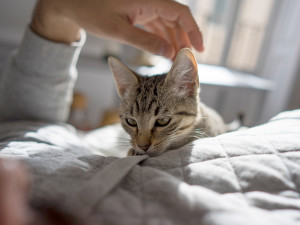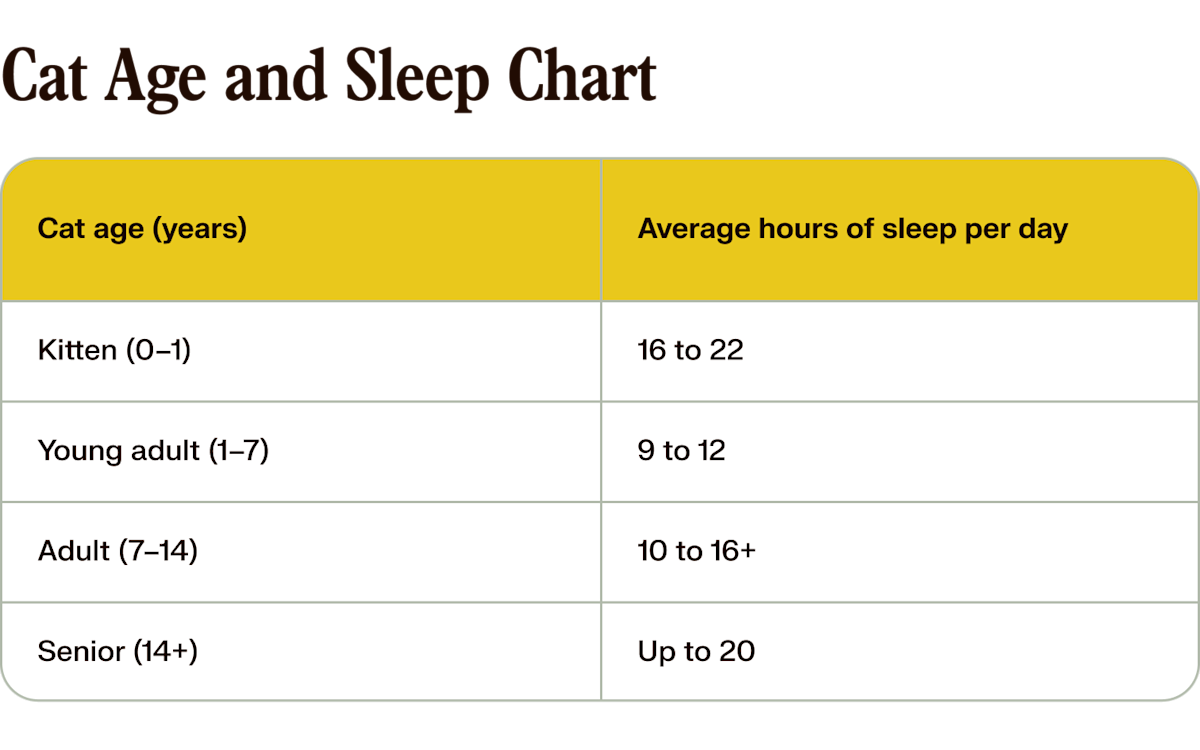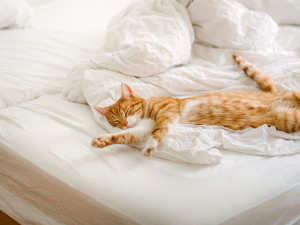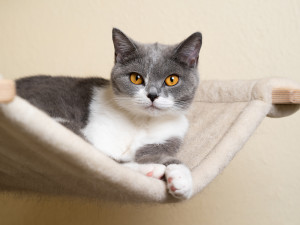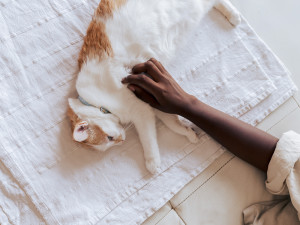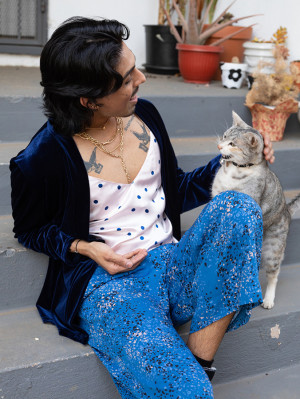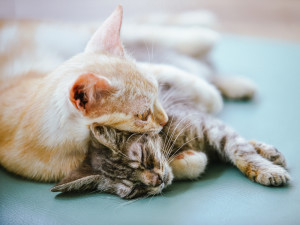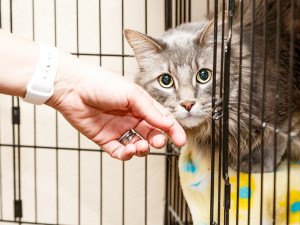Why Do Cats Sleep So Much?
A very sleepy kitty isn’t usually a problem, but watch out for these signs of medical distress.
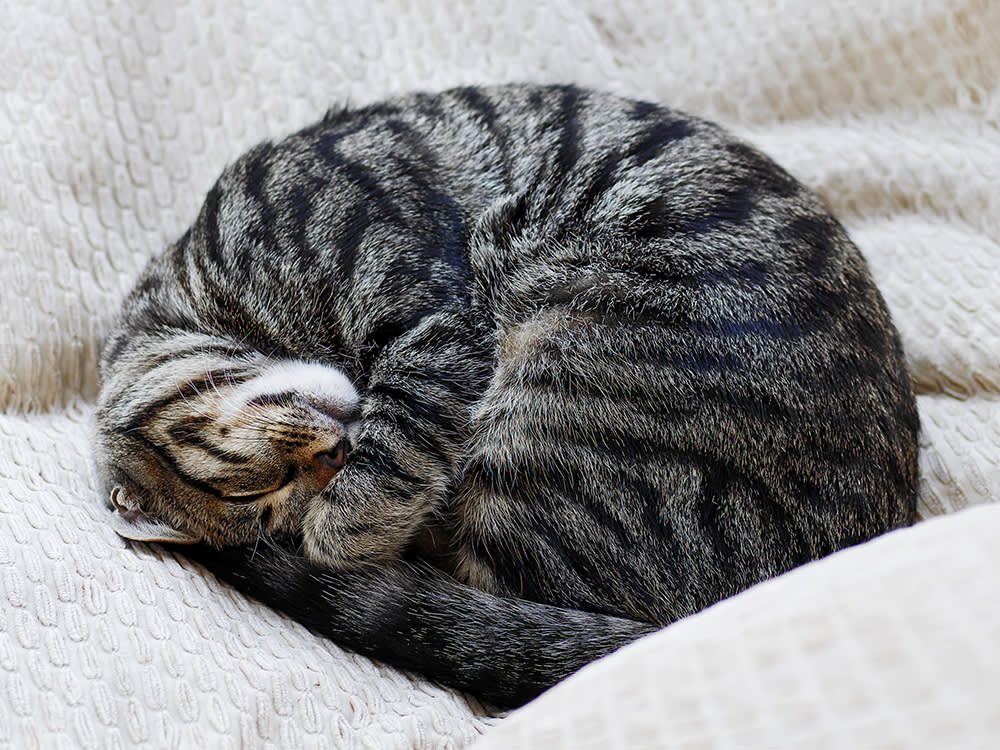
Share Article
In This Article:
Why Do Cats Sleep So Much? How Much Do Cats Typically Sleep? Reasons Why Your Cat is Sleeping So Much Is There Such a Thing as Too Much Sleep? Is Your Cat Sleeping More Than Usual? When to Be Concerned
Cats are known for their sleeping prowess, but is it possible for them to sleep too much? Also, why do they always have to wake you up so early — howling at the crack of dawn like the house is on fire? Rude. You’d lock them out of the bedroom if it weren’t for the fact that closed doors only seem to make them go wild.
So, instead, you drag yourself out of bed to tend to their every need. And as soon as they’re done, before you’ve even finished your first cup of coffee, you see them lying down for their first nap of many naps they will take that day. Does this seem overly excessive? Why does a cat need to sleep so much? We’ll get to that along with much more, so read on.
Why do cats sleep so much?
So, are cats lazy, or is that a myth? What’s the deal? That’s just how cats are, says feline behavior consultant Jennifer Van de Kieftopens in new tab. “Cats spend 40 to 50 percent of their day sleeping, usually spaced out in short intervals throughout the day, rather than all at once, like we do. It probably has to do with their instinct to hunt and their need to eat often. A cat is designed to hunt an average of ten mice per day, and they need rest in between hunts.”

Although most domesticated cats do little to no hunting, the behavior is still hard-wired into them and affects their sleeping (and eating) habits accordingly.
How much do cats typically sleep?
There’s going to be some variation in the normal amount of sleep that a cat gets based on age. Check it out:
Reasons why your cat is sleeping so much
You may think this is odd, but sleeping makes up a big part of any cat’s day. However, sometimes it may seem a bit more excessive, which could be due to any of these reasons.
It’s perfectly normal
Just like people, some cats prefer, and require, a bit more sleep to function. If your cat likes to catch a few more winks than most, chances are it’s perfectly normal, especially if it’s something they have done their whole life.
More awake at night
Cats are crepuscular, meaning they like the early hours of morning and late hours of evening to do their thing. So, that normal nine to 16 or more hours of sleep has to come in during the day and at nighttime. If a cat is spending more hours awake at night, they will need to make up for it with a lengthier slumber during the day, making it seem like they’re sleeping a lot.
Not actually sleeping
The difference between resting and actually sleeping can be hard to determine in cats. They can spend a lot of time curled up with their eyes closed, for all intents and purposes looking like they’re asleep when they actually aren’t. This resting behavior may make it seem like they are sleeping the day away, but instead, they are quite alert.
Stress or anxiety
Beneath a calm, sleepy exterior may lie a tightly wound ball of stress. Stress in catsopens in new tab can come out in many ways, including sleeping a lot. You may also see eating more or less than usual, peeing outside the litter box, and aggression. Cats can become stressed if something changes in their environment, such as a move, the addition of a family member, or a change in their schedule.
Boredom
While you won’t find a cat begging at the door with the leash in their mouth, cats do need exercise and mental stimulation every day. Otherwise, they may just sleep. Exercising a cat takes a little more creativity than it does a dog, but it can be done. Wand toys can work wonders as well as cat trees and shelves to jump and climb on. You can stimulate their mind with puzzle games or treat toys and even training.
Illness
Illnesses often bring out the sleepiness in us all. Extra sleep while you’re sick gives your body a chance to get things under control and start to heal. So, if your cat has started sleeping more, it may be that they aren’t feeling well. This may come with other symptoms, such as not eating, vomiting, diarrhea, coughing, sneezing, or a fever.
So, is there such a thing as too much sleep?
Yes, says Van de Kieft, though exactly what constitutes “too much” depends on the age and temperament of each individual cat. “An adult cat will sleep roughly nine to twelve hours, but a senior cat may sleep more, and a kitten will usually sleep less and less as they get older and in proportion to the amount of activity they are engaged in.” So, if you’ve got a new kitten and you need a little peace and quiet, make sure you wear that little fur ball out with lots of play first.
Is your cat sleeping more than usual? When to be concerned
Knowing the norm for your cat is so important, not just in relation to sleep but also eating, playing and litter box habits. If you’re familiar with what’s normal, you’re more likely to spot something abnormal.
Changes in sleeping patterns
Cats love a schedule and tend to stick to it, but if you notice a sudden shift in when and how much your cat is sleeping, it could mean there’s a problem. Cats who usually sleep through the night but are suddenly bugging you all night may mean an issue. So can cats that normally take short cat naps but are now sleeping soundly the majority of the day.
Making weird noises in their sleep
Sleep is a time when the body kind of lets it all hang out. Cats’ muscles are relaxed, and their breathing is even. There’s nothing there to inhibit or mask abnormal things. So, if they are making weird noises when they sleep, it could mean that something is wrong with them. They may be having difficulty breathing or are in pain, both of which you may not notice when they’re awake.
Changes in behavior
Cats need their beauty sleep not only for their looks but also for their behavior. A cat who isn’t sleeping enough or is sleeping too much may become somewhat of a loose cannon. They may become aggressive towards you or other pets. Or they may become clingier than usual, sleeping on you or at your feet when they normally like their space.
Lethargy or other signs
Your cat’s sleep schedule isn’t the only thing you’ll want to look into. Check them out for other signs of illness or issues such as lethargy, not eating, drinking more than usual, peeing outside the litter box, and a fever. Potential illnesses that may cause a cat to sleep more include:
Heart disease
Liver disease
Can you adjust your cat’s sleep schedule?
Cats can imprint on people, meaning they form a strong bond with them and tend to do things in a similar timeframe. But you likely won’t be able to train your cat to sleep on the same schedule you do, no matter how much you might want to.
Due to their crepuscular nature, cats are most active at the beginning and end of the day and tend to lay low the rest of the time — so a cat sleeping all day is pretty normal. If you want to sleep in a bit more in the mornings, make sure you give your cat plenty of attention and exercise right before bed, and try moving their end-of-day meal to later in the evening. You also might want to consider an automatic feeder, at least for their first meal of the day.
Play with your cat to avoid oversleeping
It’s worth noting that playtime is essential for cats at all stages of life. It keeps them happy and healthy, and gives them an outlet for their natural hunting instincts. Boredom may be a big reason why your cat is sleeping so much. So, it’s important that you keep them stimulated with cat toys, games, and even another cat or two to keep them company (if they’re into that sort of thing).
Bottom line
Cats normally sleep anywhere from 10 to 16-plus hours a day. Most of this sleep comes in the form of short cat-naps throughout daytime hours, with hopefully longer periods of sleep during the night.
Sleeping more than usual could indicate that a cat is sick, bored, or stressed. So, if your cat is suddenly sleeping more than usual or at different times, see your veterinarian.
You can do some things to make your cat’s sleep schedule more in sync with yours, though not completely. The main way to do this is to make sure they aren’t oversleeping during the day and that they are getting plenty of exercise. Feed them later in the evening to avoid early morning hunger wakings.
FAQs
How much do cats sleep in 24 hours?
Cats spend 40 to 50 percent of their day sleeping. An adult cat will sleep roughly nine to twelve hours.
Do cats need more sleep as they age?
Yes; a senior cat will likely sleep more than an adult or older kitten.
How can I make my cat more active?
Playing is a great way to keep your cat active. Keep them stimulated with cat toys and games. They may also appreciate a companion cat.
Do cats dream?
While they can’t tell us for sure, cats do undergo the same types of sleep that we do, including REM (rapid eye movement) sleep in which we dream about our day or other things. Twitching in their sleep may be a sign that your cat is dreaming.
Do cats have sleep disorders?
Cats can experience sleep disordersopens in new tab including narcolepsy and cataplexy. Both can be dangerous to a cat’s health, so it’s important to see a vet if there’s anything abnormal about your cat’s sleep patterns or behaviors.
References
Amat, Marta, Tomas Camps, and Xavier Manteca. “Stress in Owned Cats: Behavioral Changes and Welfare Implications.” Journal of Feline Medicine and Surgery. 22 Jun 2015. https://journals.sagepub.com/doi/full/10.1177/1098612x15590867opens in new tab.
“Sleeping Disorders in Animals.” Texas A&M University College of Veterinary and Biomedical Sciences. 31 Jul 2009. https://vetmed.tamu.edu/news/pet-talk/sleeping-disorders-in-animals/opens in new tab.

Charles Manning
Charles Manning is an actor and writer based in New York City. In his free time he likes to cook, go swimming at the public pool, volunteer at the LGBTQ senior center, and foster senior and special-needs cats. His work has previously appeared in Cosmopolitan, Elle, Marie Claire, Harper’s Bazaar, Seventeen, and Nylon.
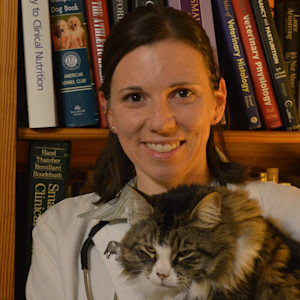
Dr. Chyrle Bonk, DVM
Dr. Chyrle Bonk has been a mixed-animal veterinarian since 2010, with a special interest in rehabilitation. When she's not practicing or writing about veterinary medicine, you may find her exploring the outdoors with her family or tending to her cows, horses, chickens, or cats and dogs.
Related articles
![kitten sleeping on top of person]()
Why Does Your Cat Sleep on You? 7 Reasons and What It Means
Not into cuddling? Too bad—they’re spending the night.
![Blue white British shorthair cat resting on a hammock]()
7 Cat Hammocks That Make the Perfect Lounge Accessory for Your Kitty
Hang loose, little dudes.
![Unrecognizable woman petting an ill cat]()
5 Common Types of Cancer in Cats, Symptoms, and Treatments
Learn how to spot the early signs to how to treat them.
![Happy stylish latino queer person looking comfortable on porch steps with gray cat.]()
Cats Lifespan: How Long Do Cats Live? And What to Expect
They are the absolute light of your life. Here’s how you can help them live as close to forever as possible.
![two bonded kittens snuggling]()
Why You Should Adopt a “Less Adoptable” Cat
Here’s why bonded kitties, senior cats, and felines with FIV make just as amazing pets as any other.
![A hand reaching towards a cat peaking out of a cage.]()
10 Questions to Ask a Shelter About an Adoptable Cat
From medical history to adoption fees to litter preferences, here is everything you need to know.

